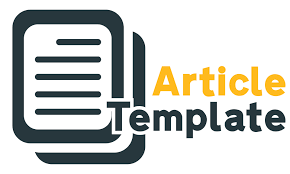WILL ACCOUNTANTS STILL EXIST? CHALLENGES OF THE ACCOUNTANT PROFESSION IN FACING TECHNOLOGICAL DISRUPTION IN THE NEW NORMAL ERA
Keywords:
Accountants, Digitization, New Normal EraAbstract
This study aims to analyze the challenges faced by the accounting profession in dealing with disruption due to the industrial revolution 4.0, 5.0, and the Covid-19 pandemic. The method used in this research is descriptive qualitative through the study of published literature studies related to problems related to the accounting profession in dealing with technological disruption as a form of adaptation to a new life in the midst of the Covid-19 pandemic on Google search, Google Scholar, and Research Gate. The results show that there are several attitudes that accountants must have to face challenges in the New Normal Era, namely Technical and Competence, Intelligence, Creativity, Digital Intelligence, Emotional Intelligence, Vision and Experience. In addition, accountants must possess soft skills as the key to success, including Leadership, Flexibility and Adaptability, Critical Thinking, Tech savvy, Communication and Emotional Intelligence, and Creativity and Innovation.
References
Andersen, C. (2019) Technology in Accounting: Disruptive Innovations and Implications,
Thesis, Ball State University Muncie, Indiana, April 2019.
Anggadini, Sri Dewi dan Surtikanti. 2021. Analisis Persepsi Mahasiswa Akuntansi Unikom Tentang Muatan Etika Dalam Pengajaran Akuntansi Keuangan. Vol 13 No 1. Jurnal Riset Akuntansi Unikom
Bariyyah, S., Okfitasari, A., & Meikhati, E. (2020). PROFESI AKUNTAN DI ERA NEW NORMAL. Jurnal Bisnis Manajemen dan Akuntansi (BISMAK), 1(1).
Blackwell, L. (2018) Audit and AI: Can Artificial Intelligence Restore Public Trust? A Senior Thesis submitted in partial fulfillment of the requirements for graduation in the Honors Program, Liberty University, Spring 2018, Retrieved from https://digitalcommons.liberty.edu/cgi/v iewcontent.cgi?article=1802&context=h onors.
Crossler, R., J. Long, T. Loraas, and B. Trinkle. (2014). Understanding compliance with Bring Your Own Device policies utilizing protection motivation theory: Bridging the intention-behavior gap. Journal of Information Systems (Spring).
Daugherty, P. R., & Wilson, H. J. (2018). Human+ machine: reimagining work in the age of AI. Harvard Business Press.
Dewayani, Tantri. 2020. Flexibel Working Space (FWS) Sebagai New Normal Kementrian Keuangan Pasca Pandemi Covid-19. https://www.djkn.kemenkeu.go.id/artikel/baca/13122/Flexible-Working-Space-
FWS-Sebagai-New-Normal-Kementerian-Keuangan-Pasca-Pandemi-Covid- 19.html
Efendi, A. (2020, August). Mekanisme Audit Kinerja Berbasis Teknologi Informatika Pada Masa Pandemi Covid-19Dan Pengaruhnya Terhadap Proses Pendidikan Dan Pelatihan Jabatan Fungsional Auditor (JFA) Aparat Pengawas Internal Pemerintah. In Prosiding Seminar Nasional Pascasarjana (Vol. 1, No. 01, pp. 53-62).
Gal, G., & Steinbart.P. (1987). Artificial Intelligence and research in accounting information systems: Opportunities and issues. Journal of Information Systems, 2, 54-62.
Jusup. Haryono. AL 2001. Dasar-Dasar Akuntansi, Jilid II. Yogyakarta: STIE YKPN
Kogan, A., M. G. Alles, M. A. Vasarhelyi, & J. Wu., (2013). Design and Evaluation of a Continuous Data Level Auditing System. Working paper, Rutgers, The State University of New Jersey.
Kominfo. Kolaborasi Tangguh Kunci Sukses Melawan Pandemi. 2021. https://covid19.go.id/p/berita/menkominfo-kolaborasi-tangguh-kunci-sukses-melawan- pandemi
Kruskopf, S., Lobbas, C., Meinander, H., Söderling, K., Eds. Martikainen M. & Lehner OM. (2019). Digital Accounting: Opportunities, Threats and the Human Factor. ACRN Oxford Journal of Finance and Risk Perspectives, 8(2019) Special Issue Digital Accounting, 1-15.
Kuenkaikaew, S. (2013). Predictive Audit. Ph.D. dissertation, Rutgers, The State University of New Jersey. Available: https://rucore.libraries.rutger s.edu/rutgers-lib/41494/
Liu, Q. & Vasarhelyi, M. A. (2014). Big Questions in AIS Research: Measurement, Information Processing, Data Analysis, and Reporting. Journal of Information Systems: Spring 2014, Vol. 28, No. 1, pp. 1-17
Gardner, Tonja Annette.2017. Exploring the Importance of Soft Skills Training for Accountants, United States : Walden University Journal
Girsch-Bock, M. (2017). Review of CCH ProSystem fx Tax. Retrieved from http://www.cpapracticeadvisor.com/revi ew/12355605/2017-review-of-cchprosystem-fx-tax
IAI. 2020. Tantangan Profesi Akuntansi dalam Pemenuhan Ekonomi Nasional PascaPandemi Covid-19. http://iaiglobal.or.id/v03/berita-kegiatan/detailberita-1308-tantangan-profesi- akuntan-dalam-pemulihan-ekonomi-nasional-pasca-pandemi-covid19
ICAEW,2018). Artificial intelligence and the future of accountancy.London: ICAEw.
Najjar, D. 2019. Is artificial intelligence (AI) the future of accounting? The Balance. Available: https://www.thebalancesmb.com/isartificial-intelligence-the-future-ofaccounting-4083182 Retrieved: 25.2.2019
Mardiasmo, 2018 .Peranan IAI dalam Mendukung Pencegahan Fraud dalam Era Revolusi 4.0.
Marr, B. (2016). Why everyone must get ready for the 4th Industrial revolution. Forbes. Published: Available: https://www.forbes.com/sites/bernardm arr/2016/04/05/ why-everyone- mustget-ready-for-4th-industrialrevolution/#ff5a3db3f90b Retrieved: 25.2.2019
Martani, Dwi. 2020. Akuntansi New Normal Peluang dan Penelitian Akuntansi. https://staff.blog.ui.ac.id/martani/files/2020/06/Webinar-Covid-Unej-26062020- 13.pdfhttps://feb.ugm.ac.id/en/research/lecturer-s-article/2886-benarkah-peran-akuntan- digantikan-oleh-teknologi-informasi
Moffitt, K. C., Rozario, A. M., & Vasarhelyi, M. A. (2018). Robotic Process Automation for Auditing. Journal of Emerging Technologies in Accounting, 15(1), 1-10. doi:10.2308/jeta-10589
Novayanti, D., & Herliana, K. "Peran Dunia Pendidikan Untuk Meningkatkan Sistem Informasi Akuntansi dalam Era Big Data dan Revolusi Industri di Indonesia" .(2018)
Parcells, S. (2016). The power of finance automation: free up your accountants to perform the kind of analysis that generates real, strategic contributions to help drive your business. Strategic Finance, 98(6), 40+. Retrieved from http://link.galegroup.com.ezproxy.libert y.edu/apps/doc/A474041253/AONE?u= vi c_liberty&sid=AONE&xid=f578b55e
Putri, R. K., Sari, R. I., Wahyuningsih, R., & Meikhati, E. (2020). Efek Pandemi Covid 19: Dampak Lonjakan Angka PHK Terhadap Penurunan Perekonomian Di Indonesia. Jurnal Bisnis Manajemen dan Akuntansi (BISMAK), 1(2).
Raschke, R., A. Krishen, & P. Kachroo. (2014). Understanding the components of information privacy threats for location-based services. Journal of Information Systems (Spring).
Rosmida. (2019). Transformasi Peran Akuntan dalam Era Revolusi Industri 4.0 dan Tantangan Era Society 5.0. Jurnal Inovasi Bisnis.
Subur, L. (n.d.). Accounting Talk Transformasi Akuntansi pada Era Digital. Retrieved from Kompasiana.com:
https://www.kompasiana.com/lizazu/5c2c296c12ae940f8754b280/akuntansi-di- erarevolusi-industri-4-0.
Sulaiman, M. Lutfi, dkk. 2020. Mengelola Perubahan dan Transformasi di Era Disruptif. http://manajemen.fe.um.ac.id/wp-content/uploads/2020/12/Prosiding-Seminar- Nasional-Ilmu-Manajemen-2020-Jilid-2.pdf
Sumarna, Alfonsa Dian, 2020, Akuntan Dalam Industri 4.0:Studi Kasus Kantor Jasa Akuntan (KJA) Di Wilayah KepulauanRiau, Jurnal KRISNA: Kumpulan Riset Akuntansi; Vol. 11, No.2 Januari 2020, pp. 100-109.



